What's happening with Russian economy?
Dynamics of Russian economy have been quite counterintuitive. Many, including myself expected the quick crash of the Russian currency. Indeed, usd/rub exchange rate initially skyrocketed. But since March 10 ruble started growing quickly🧵
Dynamics of Russian economy have been quite counterintuitive. Many, including myself expected the quick crash of the Russian currency. Indeed, usd/rub exchange rate initially skyrocketed. But since March 10 ruble started growing quickly🧵
One could assume that the ruble price somehow correlated with Russian military successes. Indeed, Russians were advancing quickly. And still, less quickly than almost everyone had expected. Plus subsequent Russian retreat from the north in early April didn't stop the ruble rise
Much better and more obvious explanation would be: the price of the ruble dependent primarily on the trade balance rather than with what was happening on the Ukrainian battlefields. Strong ruble is a result of the trade surplus. And the Russian trade surplus skyrocketed in 2022 
Trade balance depends on exports and imports. Now what does Russia export? That's the figures of 2017 but that's good enough to see the structure of its exports. It's overwhelmingly raw materials. Fossil fuels, ore, metals, mineral fertilisers. Very little machinery or equipment 
Now let's have a look on Russian import structure. It's nearly reverse. Machinery, equipment, components. It's not only the consumption products but also pretty much everything that is necessary to keep the Russian industry going from the machine tools to the cassette bearings 
To illustrate my thesis, I'll give you some examples from Russian civilian machinery, military machinery and transport. NB this is not a *proof*. That's an illustration. Let's start with civilian machinery. See an interview with the trade union leader of the Avtovaz car producer
Now let's do Russian military industry. That's a vacancy description of a construction bureau designing missiles. They are looking for a technician who would be able to write soft for machines operating on Sinumerik 840D (Siemens) & Heidenhahn software
ekaterinburg.jobfilter.ru/vacancy/893555…
ekaterinburg.jobfilter.ru/vacancy/893555…
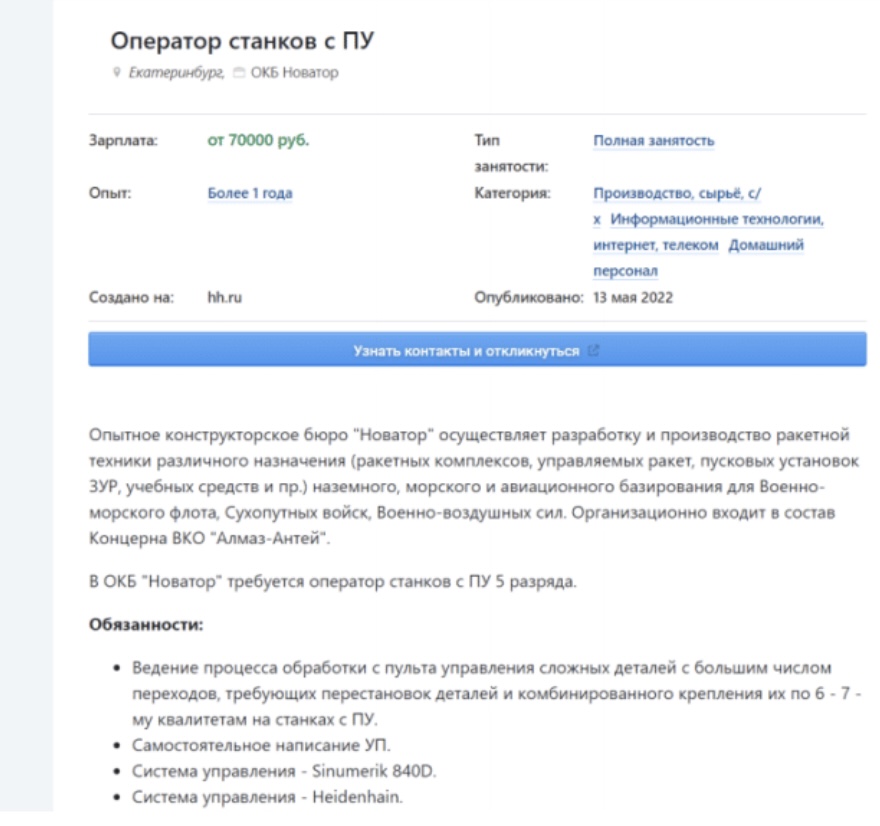
The massive use of Western, specifically German machines and software in the Russian military industry, including missiles and rockets isn't secret. It's openly shown on the Russian TV. See this Россия 1 broadcast from Kalinin plant on 3:01
"Heidenhahn"

"Heidenhahn"

FYI: this Heidenhahn using Kalinin plant in Yekaterinburg is a produce of the Russian air defence systems, including the С-300
There's a massive evidence that most of software used on Russian programmable machines in the military industry is either
Siemens
Heidenhahn
There's a massive evidence that most of software used on Russian programmable machines in the military industry is either
Siemens
Heidenhahn
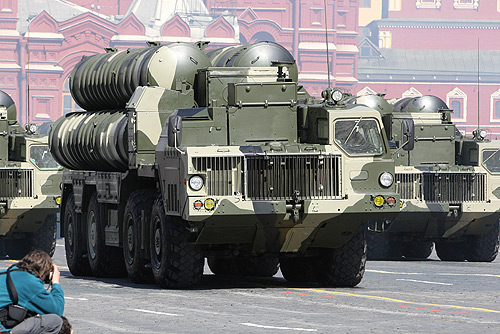
Discussions of the Russian military capacities miss one crucial element: it's total dependency upon the technological import. And vice versa, discussions on the EU-Russia relations miss the economic dependency of so many European producers upon the technological export to Russia 

Strange behaviour of Germany during the war in Ukraine might make more sense if we consider that German and Russian economies are surprisingly compatible 

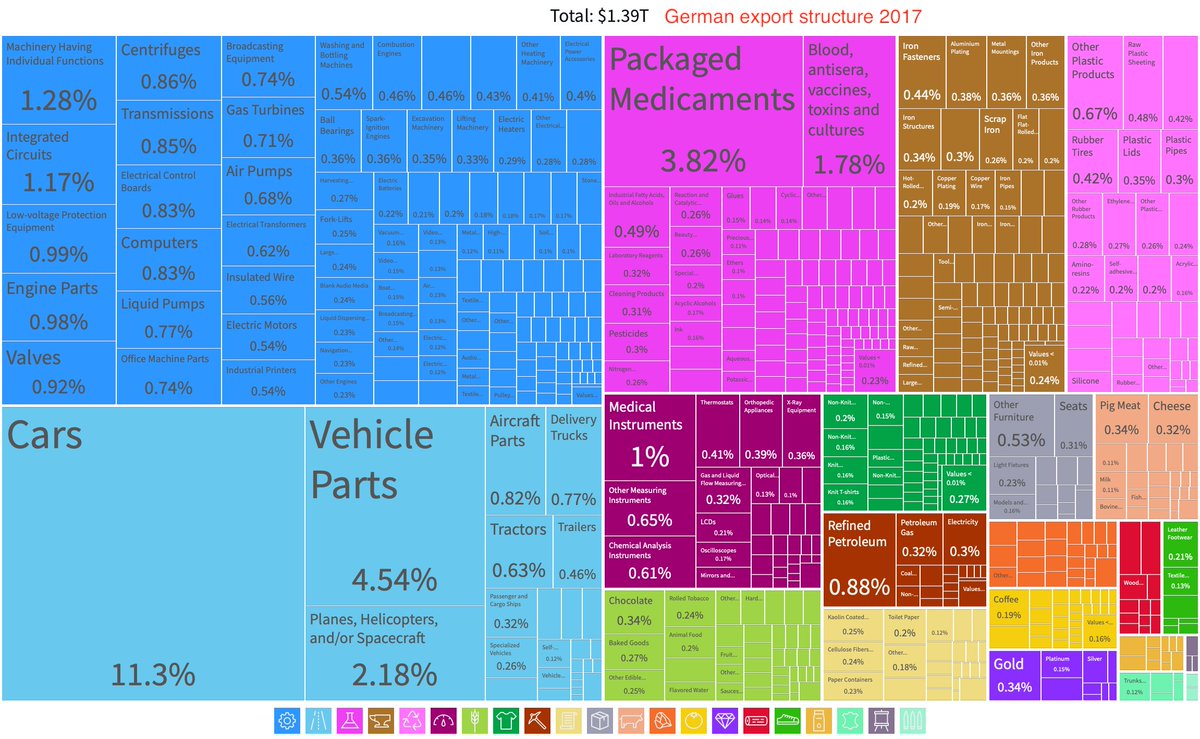

Indeed, German economy may have been a major benefactor of Putin's militarism
1. Putin builds the army
2. Pumps cash into the military industrial complex
3. Massive purchases of German machines, tools, components
bruegel.org/2022/03/the-de…

1. Putin builds the army
2. Pumps cash into the military industrial complex
3. Massive purchases of German machines, tools, components
bruegel.org/2022/03/the-de…
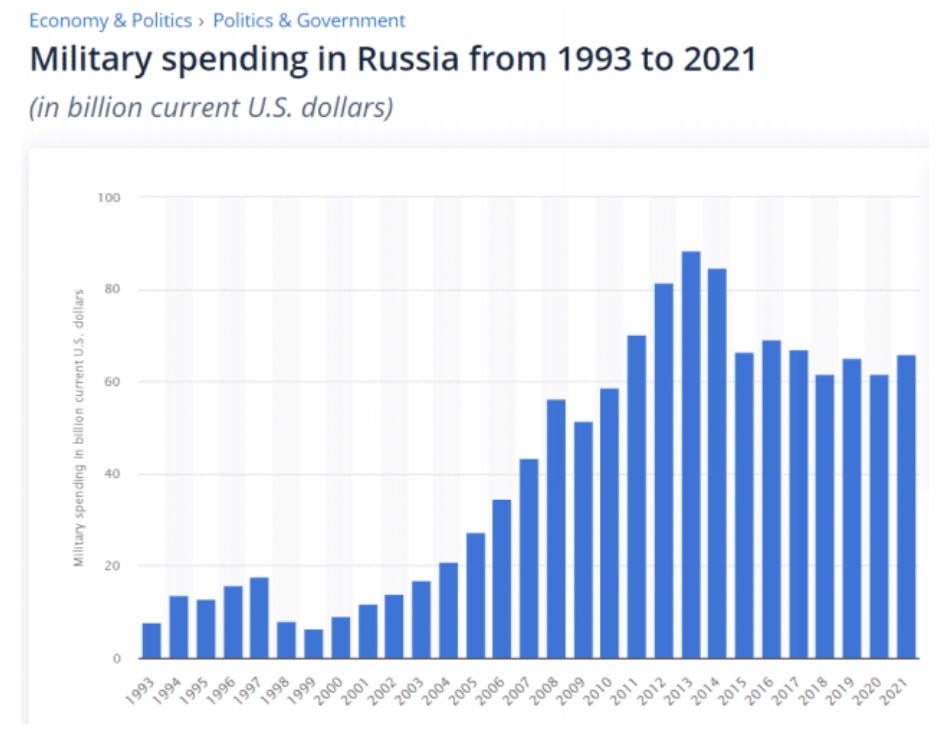

It was the Germany that was the main provider of machine tools for the Russian industry and specifically for Putin's rearmament program
(See a report of Swedish Defence Research Agency. Tomas Malmlöf. The Russian machine tool industry
Prospects for a turnaround? February 2019)
(See a report of Swedish Defence Research Agency. Tomas Malmlöf. The Russian machine tool industry
Prospects for a turnaround? February 2019)
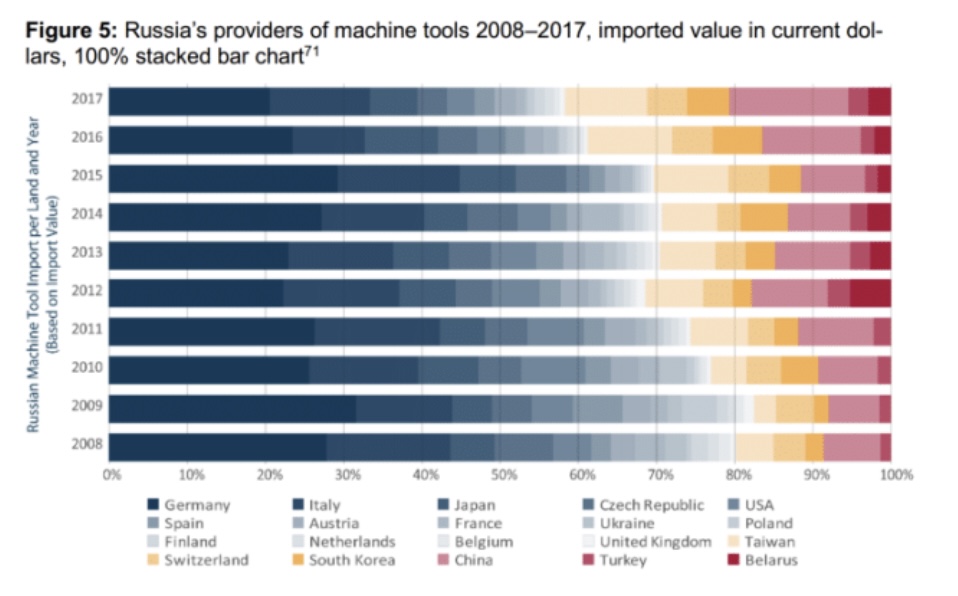
German industrial producers lobbied the government for rapprochement with Russia. Consider Christian Thönes of DMG MORI, 2015
"We are very effectively working on building relations with Russian politicians and try to influence on the German politicians"
informdom.com/uploads/metal/…
"We are very effectively working on building relations with Russian politicians and try to influence on the German politicians"
informdom.com/uploads/metal/…

Christian Thones who talked on lobbying the German politicians ("to the extent it is possible") in 2015, after Crimea, when the war in Ukraine was already going, is now the Chairman of the Executive Board of the DMG MORI
en.dmgmori-ag.com/company/execut…
en.dmgmori-ag.com/company/execut…

In this 2020 article DMG MORI was described as *the* main producer of the machine tools for the Russian military industry before the rise of Russian state-controlled STAN company. I think this is an exaggeration. Still, that's a thing to consider
realnoevremya.ru/articles/18694…
realnoevremya.ru/articles/18694…

While Germany was the major supplier of machine tools and equipment for the Putin's military industrial complex, France was also quite important as a supplier of armaments and components
See the Investigate Europe material
investigate-europe.eu/en/2022/eu-sta…
See the Investigate Europe material
investigate-europe.eu/en/2022/eu-sta…

Now let's do transport. Russia is not the Upper Volta with nukes. It's the Brazil with railways. [=absolutely reliant on railways]. Railways are the main means of:
1. Cargo
2. Long distance passenger
3. To the lesser extent, daily commuting within large urban agglomerations
1. Cargo
2. Long distance passenger
3. To the lesser extent, daily commuting within large urban agglomerations

New Russian cargo trains use cassette bearing. In 2022 there were only three producers in Russia:
Тимкен ОВК (joint venture with the American Timken)
ЕПК-Бренко (joint venture with the subsidiary of the American Amsted Rail)
ООО СКФ (Swedish SKF)
They all stopped production
Тимкен ОВК (joint venture with the American Timken)
ЕПК-Бренко (joint venture with the subsidiary of the American Amsted Rail)
ООО СКФ (Swedish SKF)
They all stopped production

I gave three brief illustrations of Russian total dependency upon technological import in:
1. Civilian machinery
2. Military machinery
3. Transport
After the start of the war the technological import stopped nearly completely, even in industries not touched by sanctions
1. Civilian machinery
2. Military machinery
3. Transport
After the start of the war the technological import stopped nearly completely, even in industries not touched by sanctions

After February 26 two things happened:
1. Sudden and almost complete obliteration of import
2. Actual increase in the export value (partially due to the rising prices on raw materials)
As a result, Russian trade surplus skyrocketed (see the graph) and the ruble grew stronger
1. Sudden and almost complete obliteration of import
2. Actual increase in the export value (partially due to the rising prices on raw materials)
As a result, Russian trade surplus skyrocketed (see the graph) and the ruble grew stronger

Paradoxically enough, the growth of raw materials export in combination with obliteration of technological import boosted the trade surplus. But this situation is simply unsustainable. Russia can't do without the technological import. It can't even sustain its fossil fuel export 
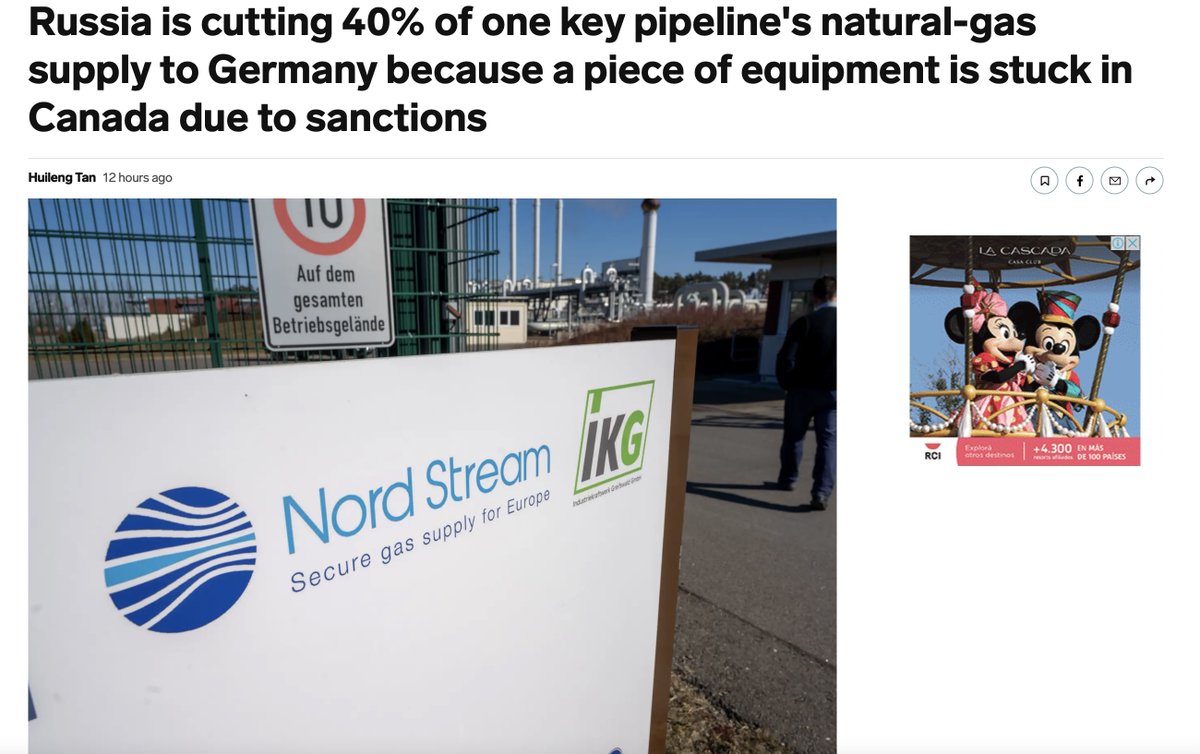
This is a very illustrative case. Nordstream gas supply decreased by 40%. Why? Siemens was supposed to repair a gas compressor and deliver it back to Russia. But due to the Canadian sanctions it can't, so the supply decreased dramatically. Now they're working on a solution 

Now let's sum up. Why has ruble grown stronger?
1. You can't judge the Russian economic dynamics on the monetary indicators
2. Trade surplus skyrocketed due to the export booming and import reduced dramatically
3. This situation is unsustainable. Russia can't do without import
1. You can't judge the Russian economic dynamics on the monetary indicators
2. Trade surplus skyrocketed due to the export booming and import reduced dramatically
3. This situation is unsustainable. Russia can't do without import
How is Russia dependent upon import?
1. Civilian manufacturing
2. Military manufacturing
3. Transport
Are all critically dependent upon imported tools & components, although the main chokepoints vary. Russian UAVs are component-dependent rather than tool dependent for example
1. Civilian manufacturing
2. Military manufacturing
3. Transport
Are all critically dependent upon imported tools & components, although the main chokepoints vary. Russian UAVs are component-dependent rather than tool dependent for example

Why is Germany supporting Russia?
Because their economies are so compatible. Putin's militarism creates demand on German precision manufacturing tools & components. Thus German industrialists try to influence German politicians to be pro-Russian "to the extent it is possible"
Because their economies are so compatible. Putin's militarism creates demand on German precision manufacturing tools & components. Thus German industrialists try to influence German politicians to be pro-Russian "to the extent it is possible"

Why is France advocating for peace?
Because it helped to keep Putin's military machine going after Crimea. After the 2014 it became much harder for the Russian military to get components for their industry. Fortunately, the French obliged and issued all the necessary licenses
Because it helped to keep Putin's military machine going after Crimea. After the 2014 it became much harder for the Russian military to get components for their industry. Fortunately, the French obliged and issued all the necessary licenses

Why China can't compensate for the loss of European suppliers?
Because Russian military producers didn't want it and the state didn't allow it. On public Putin conflicted with Europe and befriended China. In practice he didn't allow to switch to the Chinese technological import
Because Russian military producers didn't want it and the state didn't allow it. On public Putin conflicted with Europe and befriended China. In practice he didn't allow to switch to the Chinese technological import
Theoretically Russian state imposed heavy import substitution requirements for the tools for the military industry. In practice though the law is used selectively. You won't be *really* jailed for supplying a German tool pretending it's Russian. But you will be jailed for Chinese 

According to the law, supplying a foreign-produced tool as Russian to meet the import-substitution requirement is fraud. But Russia has a rule *by law*, not *of law*. The law is used selectively. If you supply German stuff, it won't be applied. Chinese though? To the jail you go 
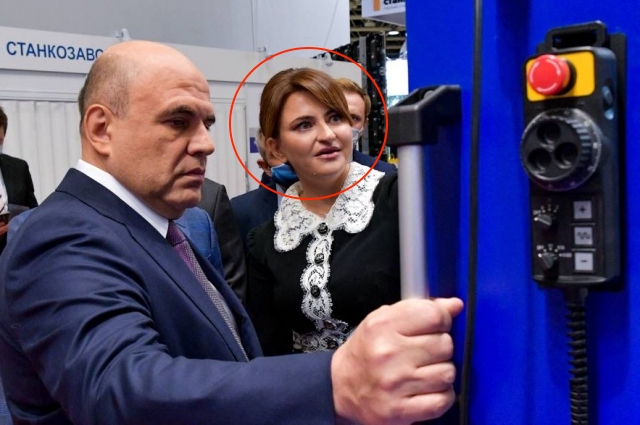
Hypothesis:
Friendship with China is a political project. It's quite possible that the Russian political leadership and the upper bureaucracy don't *really* trust the Chinese machines, tools and components as much as the Western
Friendship with China is a political project. It's quite possible that the Russian political leadership and the upper bureaucracy don't *really* trust the Chinese machines, tools and components as much as the Western
National divergence
Russian economy is falling, but it's falling unevenly. Consider a visualisation of the unemployment prognoses by a Russian state think tank ЦСР. There is a negative correlation between the economic complexity and the prognoses of unemployment increase
Russian economy is falling, but it's falling unevenly. Consider a visualisation of the unemployment prognoses by a Russian state think tank ЦСР. There is a negative correlation between the economic complexity and the prognoses of unemployment increase
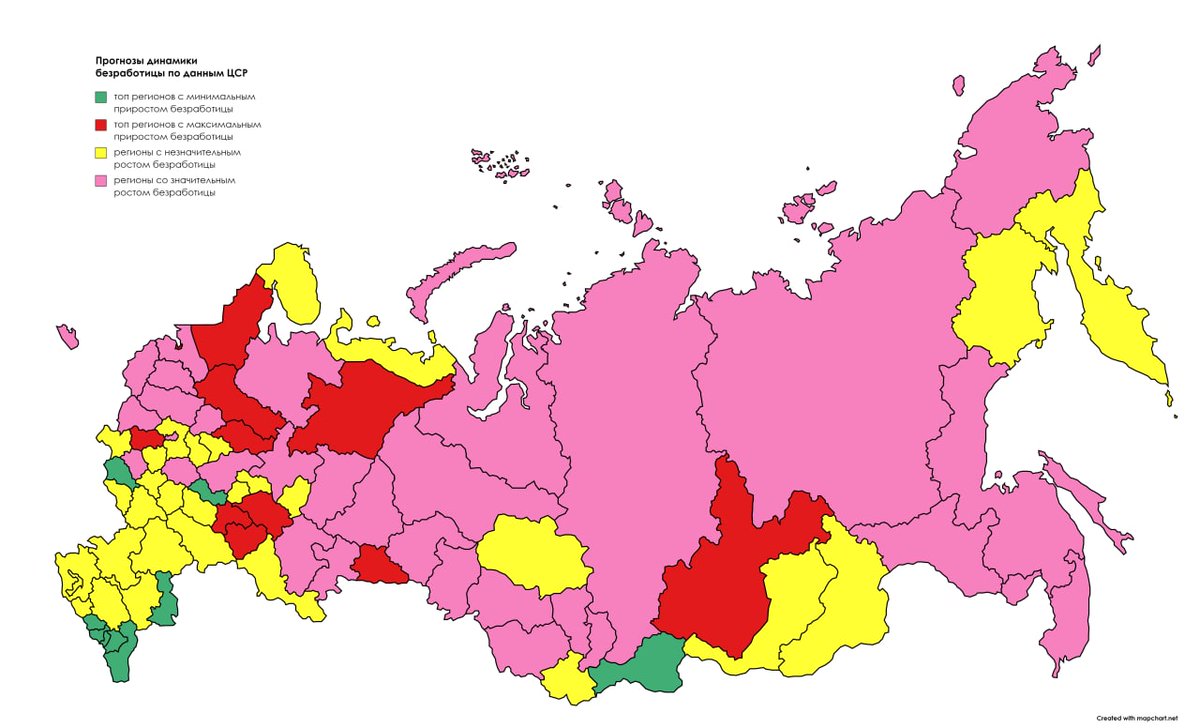
Consider these two clusters of losers. Volga cluster (Tatarstan, Samara, Ulyanovsk) and Kaluga. What unites them? Complex non-military machinery production. This sector is obliterated. Everyone who specialised on complex non-military manufacturing is destroyed by the war 

Let's compare Kaluga (red) with nearby (Tula) yellow. They are both heavily industralized but Kaluga is obliterated and Tula is doing okayish. Why? Tula is a cluster of military industry, while Kaluga made its regional economic miracle, becoming a major car production cluster 

Who's doing okayish macro economically? The agrarian south - huge yellow area to the south of Moscow. They didn't suffer that much. Moreover, according to the info I can't prove some regional elites of Southwest regions especially in Rostov are the major benefactors of the war 

Look at this map again. It doesn't only reflect the current macroeconomic situation in Russia. It's also reflecting a very long and fundamental trend - Russia is shrinking southwestward, with the demographic and economic center gradually shifting in direction of Krasnodar 
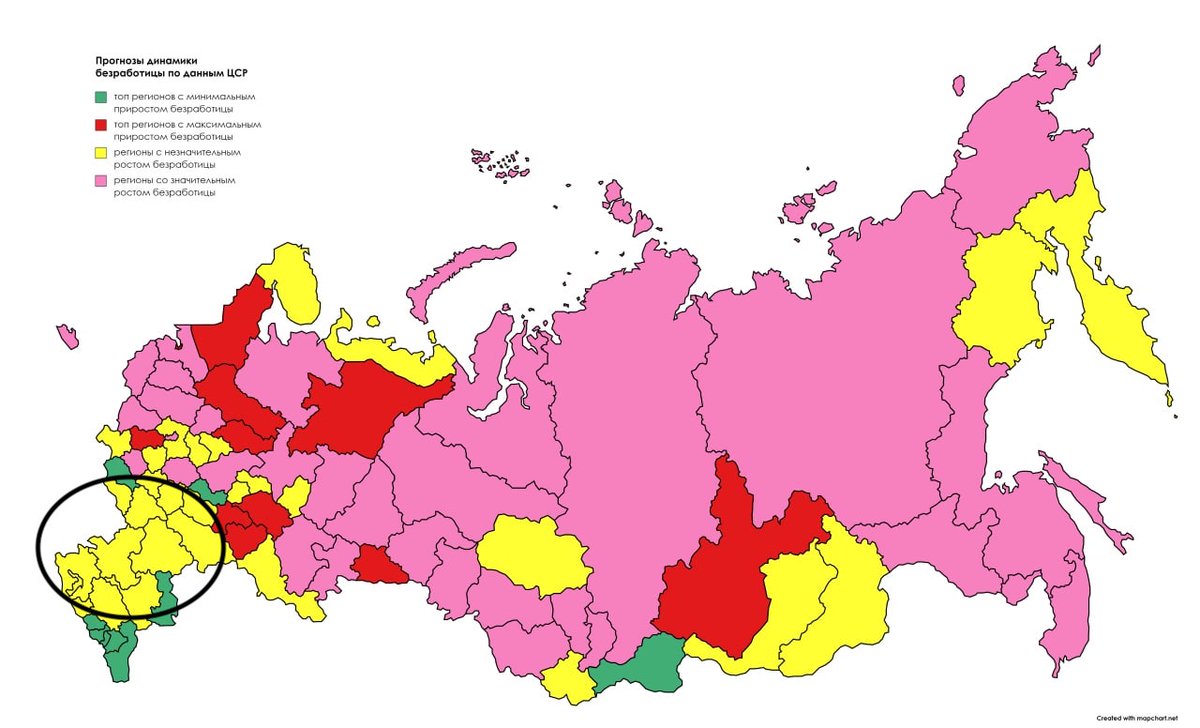
Now who's doing the best unemployment-wise? Look at the green. Those are poor and underdeveloped ethnic regions. Caucasus, Tuva, Astrakhan. That's Putin's cannon fodder
Much of the local youth will be recycled in Ukraine and those who don't will at least be employed in the army
Much of the local youth will be recycled in Ukraine and those who don't will at least be employed in the army

That's a powerful signal for the Russian regions. Your specialisation determines your fate
You serve as the cannon fodder or produce armament -> You survive
You build a complex civilian manufacturing, especially with FDI help -> You get obliterated
Lesson for the future
You serve as the cannon fodder or produce armament -> You survive
You build a complex civilian manufacturing, especially with FDI help -> You get obliterated
Lesson for the future

It's not only about Russia going the North Korea scenario right now. It's also about the signal Russian business, officials and let's be honest the people are getting. Which is:
The best way to survive is to serve the military machine of the state. Self-reliance is suicidal
The best way to survive is to serve the military machine of the state. Self-reliance is suicidal

Should Russian empire survive, its imperial ethos will be very much reinforced. On regional level, on company level, on personal level those who serve the war are doing the best
There is no salvation beyond the state and its military machine
That's what Russians gonna learn
There is no salvation beyond the state and its military machine
That's what Russians gonna learn
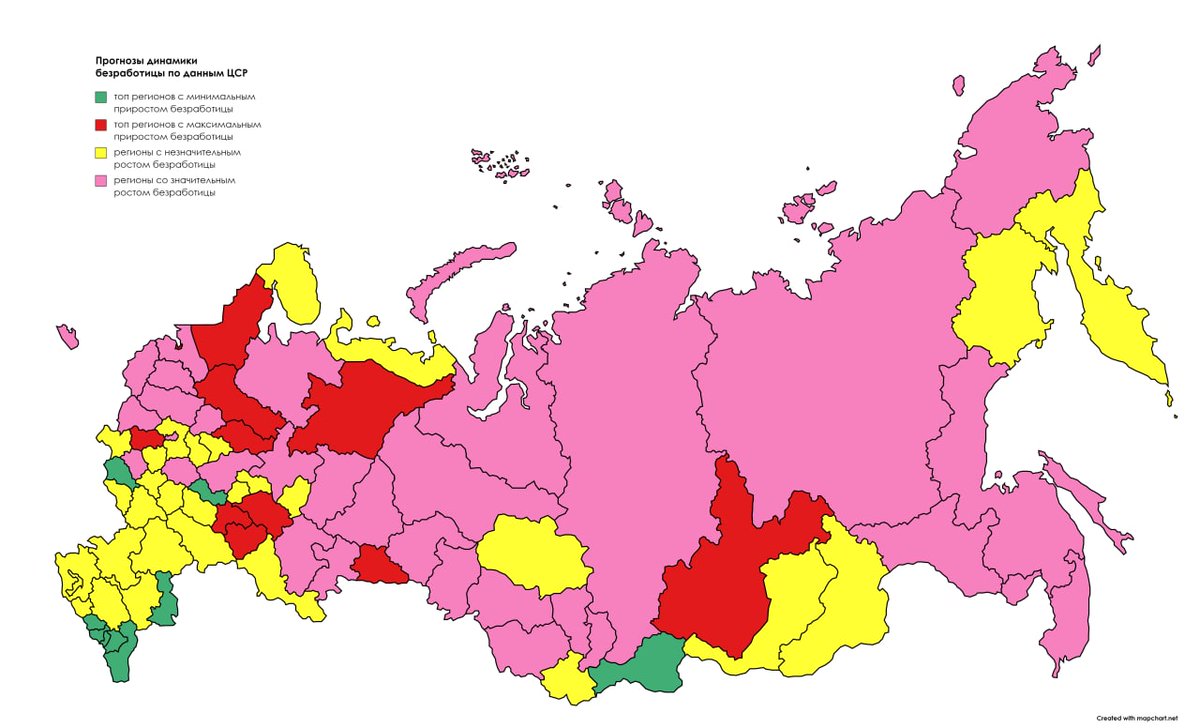
Indeed, this is exactly the reason why Russian imperialism and militarism exists in the first place
Because those who serve the war machine are being systematically rewarded and those who pursue other strategies are systematically selected out
They'll be selected out again
Because those who serve the war machine are being systematically rewarded and those who pursue other strategies are systematically selected out
They'll be selected out again
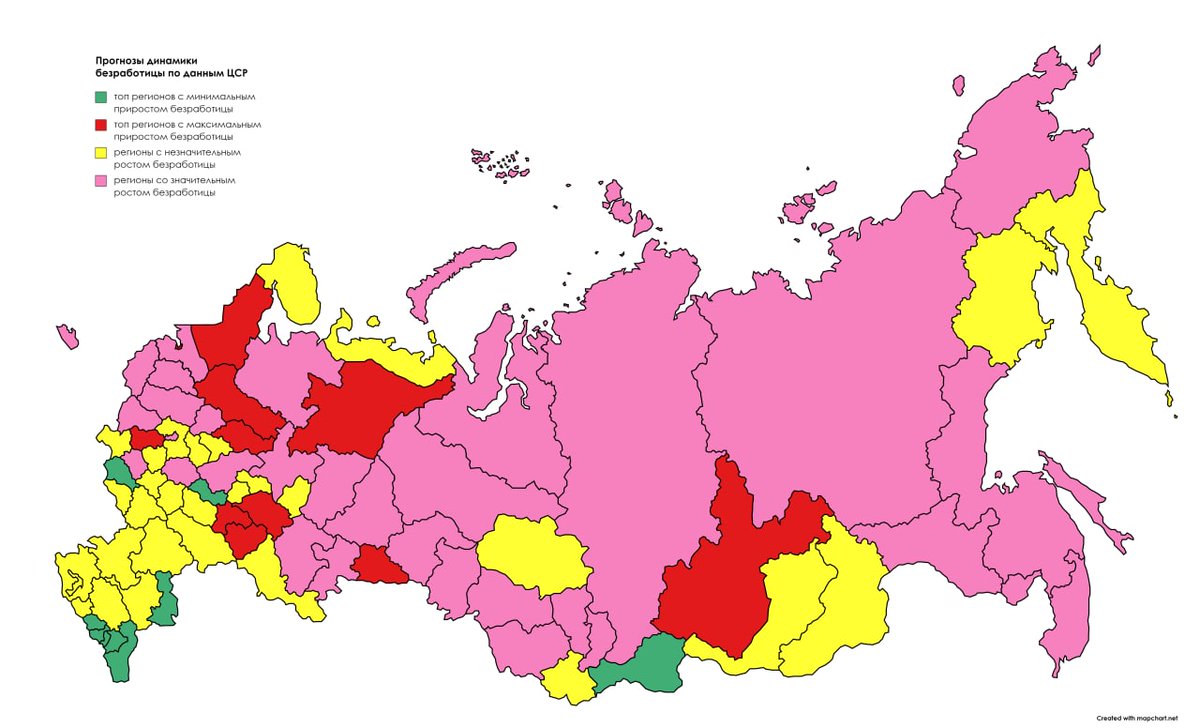
Should Russian empire survive this crisis it will become more aggressive and militaristic, no matter who rules in Moscow. People, companies, regions will once again learn that only within the state you can find salvation and that will define their future strategies
It should not
It should not

Wess Mitchell pretty openly advocated for redirecting Russian attention eastward, towards China nationalinterest.org/feature/strate…
That's a delusion. Russia is shrinking and its shrinking southwestward, to the sunbelt directly bordering Ukraine. It's shrinking *away* from China
That's a delusion. Russia is shrinking and its shrinking southwestward, to the sunbelt directly bordering Ukraine. It's shrinking *away* from China

A Strategy for Avoiding Two-Front War
The greatest risk facing the twenty-first-century United States, short of an outright nuclear attack, is a two-front war involving its strongest military rivals, China and Russia. Such a conflict woul…
https://nationalinterest.org/feature/strategy-avoiding-two-front-war-192137?page=0,2
Indeed, Putin's decision to invade which many perceived as "madness" may look less mad if we consider that Russian demographic and economic centres are objectively shrinking southwestward, towards Krasnodar. In this context, decision to expand southwest kinda makes sense 

Here I gave only few preliminary considerations regarding the Russian regional dynamics based on one single indicator - unemployment prognoses by a Russian gov think tank ЦСР. I'll give more details and sources in my next thread on the National Divorce. End of 🧵
• • •
Missing some Tweet in this thread? You can try to
force a refresh










